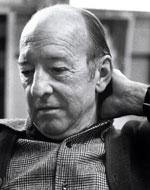
William Appleman Williams was one of those historians who knew that the accepted truths and opinions are always false and that the real heroes of history are not those who hasten to conceal themselves behind their laurels. He believed that an historian must be first and foremost a teacher, a molder of the people, in the truest sense of the word - one who is capable of enlightening the people with regard to their own heritage and showing how it really happened. In this understanding of the practical meaning of writing history Williams was the direct and most recent successor of Beard. What distinguished him from Beard was a more comprehensive conception of who was to be included as an American, and also the absolute rejection of any notion of America as exceptional. For Williams, America was goy b'goyim - only one of many nations in the wilderness of this world, and therefore to be judged morally and politically by an ethics based on nothing more than good, old common sense. He never grew tired of repeating these conclusions - which were far from being accepted by American political culture - and they were to become the essential themes of his work.
The defeat of the U.S. in the Vietnam War and the resultant impact on America's self-confidence oddly enough put Williams for the moment in the mainstream. In 1980, the Organization of American Historians chose him as its annually elected president. The same year saw the appearance of his last book, Empire as a Way of Life: An Essay on the Causes and Character of America's Predicament Along with a Few Thoughts about an Alternative, published by the prestigious Oxford University Press. Revisionism had become more or less respectable, even fashionable. The nation was trying hard to integrate both those who had been for and those who had been against Vietnam - and these two groups were threatening to become one and the same in their common opposition to the Establishment - into a new and modified national consensus. Still, Williams soon had to recognize that even in this new climate there was in the long run no room for opinions such as his. Criticism of the war was permitted, and also of its conduct. But both the imperialist Open Door and Containment policies were off limits.
Table of Contents
- On Academic Discourse and the Search for Truth
- Father of the Revisionist School
- The Open Door at Home
- A World Power Against its Will
- Transferring the Frontier Overseas
- An Unheard-Of Provocation
- From Corpus Christi to Madison
- Williams the Teacher
- Unexpected Icons
- Into the Mainstream, Briefly
- A Farewell Song


